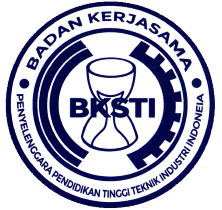Publication Ethics
Industrial Vocational E-Journal On Agroindustry (INVENTORY) is committed to upholding the highest standards of publication ethics and takes all possible measures against publication malpractice. Authors who submit papers to INVENTORY attest that their work is original and unpublished, and is not under consideration for publication else where. In addition, authors confirm that their paper is their own; that it has not been copied or plagiarized, in whole or in part, from other works; and that they have disclosed actual or potential conflicts of interest with their work or partial benefits associated with it.
DUTIES OF EDITORS
Decision on the Publication of Articles
The Editor in Chief of INVENTORY is responsible for deciding which of the articles submitted to the journal should be published. The Editor in Chief may be guided by the policies of the journal's editorial board and subjected to such legal requirements regarding libel, copyright infringement and plagiarism. The Editor in Chief may confer with other editors or reviewers in making this decision.
Review of Manuscripts
The Editor in Chief must ensure that each manuscript is initially evaluated by the editor/co-editor, who may make use of appropriate software to examine the originality of the contents of the manuscript and after passing this test, manuscript is forwarded to two referees for blind peer review, and each of whom will make a recommendation to publish the manuscript in its present form or to modify or to reject the same. The time required for each review stage is at least a month after the reviewer states willingness (each article has a different review stage, depending on the quality of the article). If the article is of very good or very poor quality, it is possible to get a decision faster.
Disclosure and conflicts of interest
Unpublished materials disclosed in a submitted manuscript must not be used by anyone who has a view of the manuscript in his or her own research without the express written consent of the author.
Fair play
Manuscripts shall be evaluated solely on their intellectual merit without regard to authors’ race, gender, sexual orientation, religious belief, ethnic origin, citizenship, or political philosophy.
Confidentiality
The Editor in Chief/editors and any editorial staff must not disclose any information about a submitted manuscript to anyone other than the corresponding author, reviewers, potential reviewers, other editorial advisers, and the publisher.
DUTIES OF REVIEWERS
Promptness
In case, any reviewer feels that it is not possible for him/her to complete review of manuscript within stipulated time then the same must be communicated to the editor, so that the same could be sent to any other reviewer.
Confidentiality
Information regarding manuscripts submitted by authors should be kept confidential and be treated as privileged information.
Standards of Objectivity
Reviews should be conducted objectively. There shall be no personal criticism of the author. Reviewers should express their views clearly with supporting arguments.
Acknowledgement of Sources
Reviewers should identify relevant published work that has not been cited by the authors. Any statement that had been previously reported elsewhere should be accompanied by the relevant citation. A reviewer should also call to the Editor in Chief's attention any substantial similarity or overlap between the manuscript under consideration and any other published paper of which they have personal knowledge.
Conflict of Interest
Reviewers should not review manuscripts in which they have conflicts of interest resulting from competitive, collaborative, or other relationships or connections with any of the authors, companies, or institutions connected to the papers.
DUTIES OF AUTHORS
Reporting standards
Authors of reports of original research should present an accurate account of the work performed as well as an objective discussion of its significance. Underlying data should be represented accurately in the paper. A paper should contain sufficient detail and references to permit others to replicate the work. Fraudulent or knowingly inaccurate statements constitute unethical behavior and are unacceptable.
Data Access and Retention
Authors may be asked to provide the raw data in connection with a paper for editorial review, and should be prepared to provide public access to such, if practicable, and should in any event be prepared to retain such data for a reasonable time after publication.
Originality and Plagiarism
Authors should ensure that they have written entirely original works, and if the authors have used the work and/or words of others this must be appropriately




